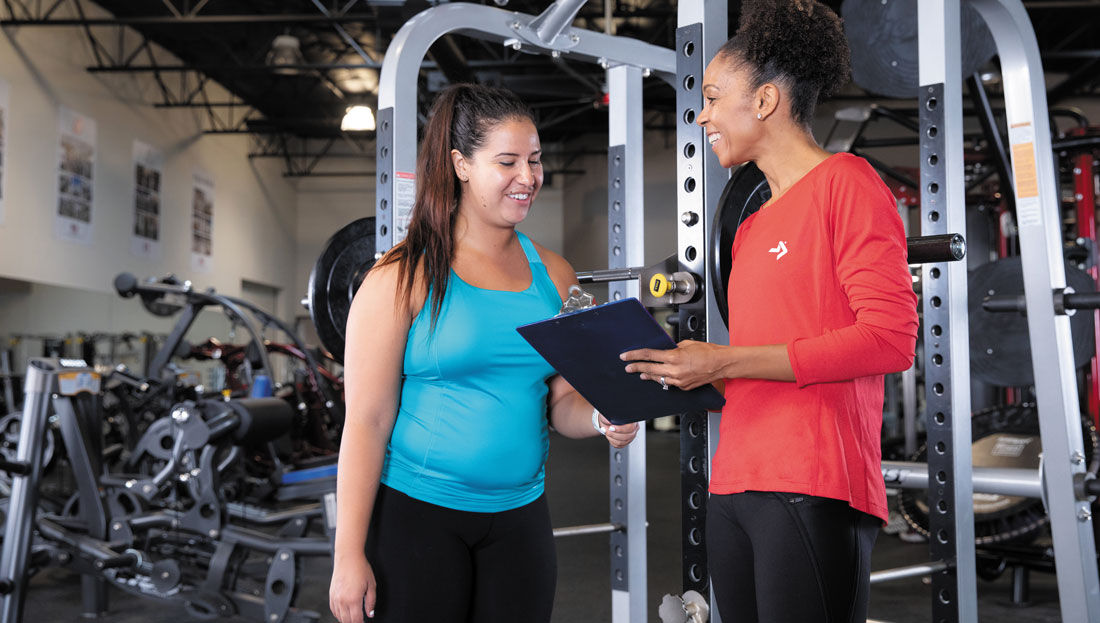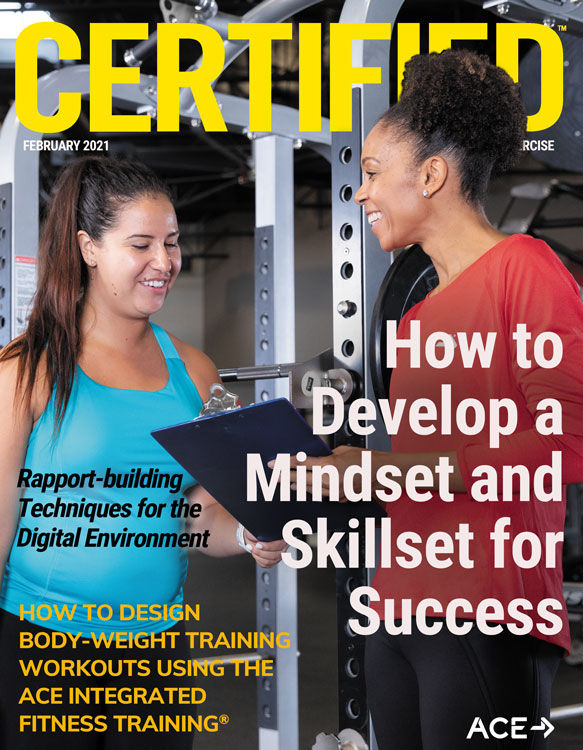
Business skills can mean the difference between just getting by and being successful, between fitness being a side hustle and it being a long-lasting career. If you’re like many health coaches and exercise professionals, you may feel a little intimidated by the terms “business,” “marketing” and “sales” or simply think those skillsets are outside your field of expertise. You may be frustrated by the need to add another arrow to your quiver when you’ve already devoted so much time mastering communication skills, program design and leadership techniques.
It’s similar to reaching the last chapter of your personal training textbook when preparing for your ACE Certification Exam, only to find that it covers professional and legal responsibilities. “Great,” you might think, “I’ve just spent months learning about anatomy, physiology and exercise programming and now I have to study business structures and liability insurance?” It can feel like an unfair add-on and is probably not what you signed up for when you chose to pursue a career in fitness.
The intent of this article is not simply to teach you a handful of business skills, but more importantly, to explain why learning them is so vital and to empower you to take the leap into an element of your career that you may have been overlooking.
Start With “Why”
“Whether you decide to work for someone else or for yourself as a service professional—which is what you are as a personal trainer, group fitness instructor or health coach—you still have to have a business mindset,” says Shannon Fable, ACE emeritus board member and subject matter expert and a Book Yourself Solid Business Coach.
Developing business acumen allows you to “take control of identifying who you’re trying to serve, what you’re trying to help them do and why you’re doing it,” explains Fable.
Taking control is the key piece of this puzzle. If the events of this past year have taught us anything in the fitness industry, it’s that you can’t necessarily depend on your employer to make you successful and provide you with a steady income. Fitness facilities play an essential role in the industry and are the primary source of employment for many health coaches and exercise professionals, but you should aim to gain or retain control of your ability to pivot and shift the focus of your career when necessary.
The pandemic, of course, is a dramatic example of a catalyst for course correction. Consider a more commonplace example: If you unexpectedly move across the country so that your spouse can pursue a new job opportunity, you may be able to hold onto some of your current clients if you’ve already introduced them to virtual sessions, sold your clients on the value of the work you do together and can hit the ground running in terms of selling your services to a new pool of potential clients if you have the infrastructure and proper skill set in place.
3 Areas of Focus
ACE asked Shannon Fable, who is an ACE Certified Personal Trainer, Health Coach and Group Fitness Instructor, and Jen Kates, CHC, Pn2, NASM-CPT, Founder and Coach at Shift Human Performance and an ACE Certified Health Coach, to identify the areas where health coaches and exercise professionals should focus their business education to best position themselves for long-term success.
1. Business Writing and Professional Communication
Perhaps a bit surprisingly, business writing and professional communication were at the top of both Fable and Kates’ lists. You may think that writing isn’t a particularly important element of being a health coach or exercise professional but, even if you don’t write blogs or maintain a robust website, you likely communicate with potential and current clients or participants via social media posts, emails and texts each and every day.
“People are deciding whether to buy into what you’re doing, and with so much content coming at them, you have to stand out as a professional in that sea of written and verbal communication or you’re going to fall by the wayside,” Fable explains. “It’s not enough to just know fitness and health. You have to present yourself in a professional way.”
Kates emphasizes the importance of content creation. “You have to be able to offer free advice or free content,” she says. This may run counter to your instincts, but Kates asks how potential clients can be expected to trust you without knowing what you have to offer and the approach you take to coaching or training.
Remember, word-of-mouth marketing—still the best and most cost-effective marketing tool there is—can build from impromptu conversations or social media posts. “Building trust through good content can help captivate your audience,” suggests Kates.
One last element of professional communication that Kates highlights is the ability to speak to groups, on camera or in online forums. With so much of the fitness industry now existing in the virtual space—and it’s likely that at least some of your business will stay in that space for the foreseeable future—it’s more important than ever to be comfortable on camera and in front of groups.
2. Sales and Marketing
“Don’t let marketing scare you,” says Fable. “You’re not trying to create ads and slogans and commercials, but you do have to be able to position yourself in the marketplace to attract the clients you are meant to serve.”
You know that you provide a service that is extremely valuable. Sales and marketing are really about figuring out how to demonstrate that value to those individuals who want or need it most. This ties directly into professional communication, as marketing involves building a social media presence, putting yourself out there in your community and telling people how you can improve their lives, clearly, succinctly and professionally.
“It’s really important to be good at sales,” says Kates, “especially if you’re doing remote or virtual coaching or training. You have to be able to paint a picture with the client of their end result and what that will feel like to them, then make it clear that that is what they are investing in. They are ultimately investing in your ability to help them achieve that end result.”
3. Having a Business Mindset
You’re running an organization, even if it’s an organization of one. You will sometimes feel overwhelmed by the many tasks—daily, weekly, monthly, quarterly and annually—that are required to keep your business afloat.
It’s essential that you avoid getting lost in the day-to-day minutia and give yourself the time and space needed to develop and pursue goals in a proactive way. Personal trainers, for example, tend to be very reactive—creating programs, leading sessions and keeping that going until a client drops out and the trainer has to fill that slot in their schedule.
But what do you do when fitness facilities close? Or when you are injured or ill?
If your income grinds to a halt when faced with a challenge (granted, a global pandemic is a pretty extreme challenge), then it may be time to rethink your business model.
Your goal, according to Fable, should be to create an ecosystem in which you can be a proactive businessperson rather than a reactive one. Fable recommends allotting a minimum of 10 to 15% of your weekly working hours as “office hours.” “By office hours,” she says, “I don’t mean pushing papers, taking care of billing and touching base with people. I mean setting aside time to proactively think about what you need to do to sustain and grow your business.” Essentially, during this time you are stepping outside your role as a health coach or exercise professional and thinking only as a business owner.
If you can expand both your business mindset and skillset, you will be well on your way to developing a plan for sustainable success in the fitness industry.
Learning From the Past, Planning for the Future
Depending on how you entered the year 2020, you likely found yourself in one of two positions a couple of months in (after a few almost universally shared weeks of disbelief and confusion): (1) hoping and praying that the facility where you worked would reopen sooner rather than later or (2) pivoting your business to a new way of delivering your services to your clients.
The difference in the ability to adjust your business model in large part lies with how prepared you were before the pandemic hit. Did you have the infrastructure in place to communicate effectively with existing clients and deliver your sessions in a new way? Had you developed the sales and marketing skills to change your message to one that focused on virtual sessions, outdoor classes or other means of serving your clients?
Remember, a setback or disruption, whether it’s on a global or personal scale, is not the time to try to build the infrastructure to respond. You likely teach your clients to anticipate and prepare for inevitable lapses in their exercise or lifestyle-change programs, look ahead at potential obstacles and develop strategies to avoid or overcome them. The same strategy holds true for you as a business owner.
Being proactive and doing the necessary thinking and work to be best positioned to avoid setbacks and seize unforeseen opportunities when they arrive may be the key to a long and successful career in the fitness industry.
One final note about gyms and other fitness facilities: As they reopen, clubs are struggling, and they are going to continue to struggle as they figure out the way forward. None of the above advice is meant to diminish the important role that these facilities play in the industry. In fact, your ingenuity and personal innovations can be an important part of the solution for these facilities. If you operate with a business mindset, even if you are an employee of the club, you will have done the requisite thinking and can come to the table with solutions rather than questions and demands.
The type of proactive thinking described above positions you to act as a partner in charting a new direction forward for the industry, which is what all of us should be working toward.
ACE is dedicated to helping exercise and health professionals find their unique path to getting people moving. Check out the
Pro Advice category in our ACE Insights blog for additional information and inspiration.





 by
by 


